|
|
|
Sort Order |
|
|
|
Items / Page
|
|
|
|
|
|
|
| Srl | Item |
| 1 |
ID:
054266
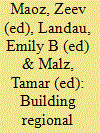

|
|
|
|
|
| Publication |
London, Frank Cass, 2004.
|
| Description |
ix, 190p.
|
| Standard Number |
0714684260
|
|
|
|
|
|
|
|
|
|
|
|
Copies: C:1/I:0,R:0,Q:0
Circulation
| Accession# | Call# | Current Location | Status | Policy | Location |
| 048766 | 327.170956/MAO 048766 | Main | On Shelf | General | |
|
|
|
|
| 2 |
ID:
164173
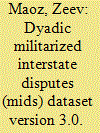

|
|
|
|
|
| Summary/Abstract |
We introduce the new, substantially updated, and revised version of the Dyadic Militarized Interstate Disputes (MIDs) dataset. We discuss the underlying logic of constructing dyadic MIDs and demonstrate that these operations generate significant differences between the actual occurrence and properties of MID dyads and those extracted from machine-generated programs such as EUGene, or from the MID participant dataset. We provide some descriptive measures of dyadic MIDs over the period of 1816 to 2010 and compare some of the key dyadic results on the correlates of MIDs using different datasets. We discuss the theoretical and empirical implications of our results.
|
|
|
|
|
|
|
|
|
|
|
|
|
|
|
|
| 3 |
ID:
145691


|
|
|
|
|
| Summary/Abstract |
We study the effects of shocks – such as major wars that change states’ strategic environments – on alliance networks. This has important implications for the structure of security cooperation networks. We develop an agent-based model (ABM) that: (1) models network evolution processes of security cooperation networks; (2) induces shocks that cause significant changes in agents’ utilities due to shifts in common interests between states; (3) analyzes how networks reorganize in the post-shock period. We derive propositions from the ABM about the relationship between shock attributes and network structure. We compare the results of the ABM to similar shocks that operate on real-world alliance networks. The ABM results with random network data suggest that states that experience dramatic changes in their strategic environment increase network connectivity and consistency. Consequently, post-shock networks become increasingly connected (denser) and consistent (transitive). With a few notable exceptions, these results are corroborated by analysis of alliance network reorganization following shocks. We discuss the theoretical and empirical implications of the results and offer directions for future research on shocks and international networks.
|
|
|
|
|
|
|
|
|
|
|
|
|
|
|
|
| 4 |
ID:
079575
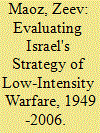

|
|
|
|
|
| Publication |
2007.
|
| Summary/Abstract |
This study examines the strategic and tactical logic of Israel's limited uses of force against Arab states and against substate actors. It evaluates the effectiveness of these policies, and their political and strategic ramifications. The study is based on a historical survey of these policies and on quantitative analysis of a dataset of the use of limited force by Israel over the 1949-2003 period. The findings suggest, first, that limited force strategies were occasionally used to foster escalation. In other cases, the mismanagement of limited engagements resulted in inadvertent escalation to full-blown wars. Second, domestic political and social considerations had important effects on the nature and intensity of Israeli uses of limited force. Third, Israeli reliance on offensive strategies has not only consistently failed, but produced adverse military and diplomatic side effects. Defensive and preventive measures have shown a much greater degree of success. The study concludes that a combination of military and diplomatic measures produces far more effective results than strictly military ones
|
|
|
|
|
|
|
|
|
|
|
|
|
|
|
|
| 5 |
ID:
175191


|
|
|
|
|
| Summary/Abstract |
How does the anticipation of external support for both opposition groups and governments affect the likelihood and form (violent vs. nonviolent) of uprising within states? We develop a novel approach to address these issues, building on a network perspective. Our model suggests that both opposition groups and governments’ strategies are affected by an anticipation of the degree and nature of expected support by external parties (states and non-state actors). Using a set of indicators – including cultural affinity, strategic factors, and normative values – we develop a unique measure of anticipated support based on the potential support networks of target states and their opposition in order to evaluate our hypotheses. We argue that the anticipated balance of support for opposition and governments affects: (a) the likelihood of uprising and (b) the principal – violent or nonviolent – strategy used by the opposition group. We analyze data on violent and nonviolent civil conflicts over the period 1946–2010. We find that when the balance of anticipated support favors the opposition over their target government, the onset of an uprising is more likely. Specifically, the type of anticipated support has implications for whether a violent or nonviolent uprising occurs. These findings provide new insights into the role external support can play even before conflict occurs.
|
|
|
|
|
|
|
|
|
|
|
|
|
|
|
|
| 6 |
ID:
072701
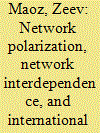

|
|
|
|
|
| Publication |
2006.
|
| Summary/Abstract |
This study examines the effect of polarization and interdependence on systemic conflict. It argues that both polarization and interdependence must be conceptualized in terms of different types of relations among states and that different relationships would reflect varied levels of polarization and inter-dependence. Accordingly, this study develops general measures of network polarization and interdependence that allow measurement of these concepts over a wide array of international relations. Hypotheses are deduced from the realist and liberal paradigms about how alliance polarization, trade polarization, and cultural polarization affect systemic conflict. Likewise, hypotheses are deduced regarding the expected effects of strategic and economic interdependence on conflict. These hypotheses are tested using data on alliance, trade, linguistic, and religious networks over the period 1816-2002. The findings suggest that alliance polarization and strategic interdependence increase the amount of systemic conflict, while trade polarization and economic interdependence have a dampening effect on the amount of conflict in the international system. The theoretical implications of these results are discussed.
|
|
|
|
|
|
|
|
|
|
|
|
|
|
|
|
| 7 |
ID:
037212
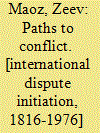

|
|
|
|
|
| Publication |
Boulder, Westview Press, 1982.
|
| Description |
xviii, 273p.
|
| Standard Number |
0865319332
|
|
|
|
|
|
|
|
|
|
|
|
Copies: C:1/I:0,R:0,Q:0
Circulation
| Accession# | Call# | Current Location | Status | Policy | Location |
| 022817 | 327.1609/MAO 022817 | Main | On Shelf | General | |
|
|
|
|
| 8 |
ID:
065950


|
|
|
| 9 |
ID:
118173
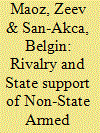

|
|
|
|
|
| Publication |
2012.
|
| Summary/Abstract |
This study examines the conditions under which states engaged in strategic rivalries choose to support Non-state Armed Groups (NAGs) that target their rivals. NAGs include ethnic or religious insurgents, guerilla organizations, and terrorists. We develop a rational choice model of state support for NAGs. We focus on state support of NAGs as cooperation between states and NAGs emerging out of a mutual and purposive decision-making process. The model suggests that decisions of states to support NAGs targeting a rival are affected by dissatisfaction with the status quo and the expected risk of retaliation. Rivalries create opportunities for NAGs that operate against one of the rivals, allowing them to acquire resources to sustain their operations. The presence of rivalry increases the likelihood of state-NAG cooperation. In turn, state-NAG cooperation increases the likelihood of rivalry escalation. We test the propositions of the model using an original data set that includes observations for 175 NAGs and 83 state supporters in the post-WWII period. We find consistent support for our propositions. We discuss the implications of these results for the theory and practice of international relations.
|
|
|
|
|
|
|
|
|
|
|
|
|
|
|
|
| 10 |
ID:
073761


|
|
|
|
|
| Publication |
2006.
|
| Summary/Abstract |
The concept of international affinity-albeit under different names-captures a central place in international relations research. This study examines how different types of affinity affect the likelihood of conflict between states. The authors discuss different types of affinities as these appear in the realist and liberal paradigms. They offer a social networks conception of structural affinity-the concept of structural equivalence-which reflects the similarity of international ties across a set of different networks. They test the hypotheses derived from these paradigms, using both existing measures of affinity and their own structural equivalence measures. Their findings suggest that (1) strategic affinity has a consistent dampening effect on the probability of dyadic conflict, (2) trade-related affinity does consistently affect the probability of dyadic conflict, and (3) intergovernmental organization-related affinity has a negative impact on conflict, mostly in the twentieth century.
|
|
|
|
|
|
|
|
|
|
|
|
|
|
|
|
|
|
|
|
|